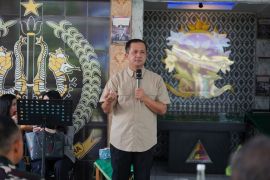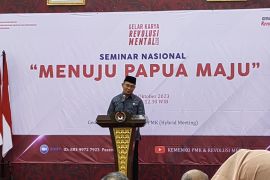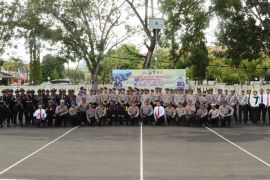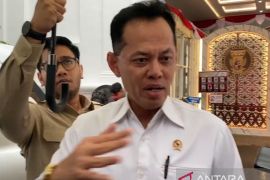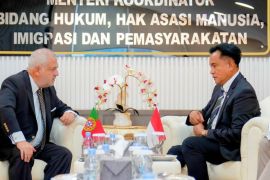The presence of Yigibalom and other young Papuans at the IT Del campus has infused new life into the multicultural setup of the university.Jakarta (ANTARA News) - Premi Yigibalom represents the bright future of young native Papuans amid the poor human development index of Papua, Indonesias easternmost province.
He is currently pursuing a bridging program at the Del Institute of Technology (IT Del), a higher education institution that Luhut Binsar Pandjaitan, a noted and respected figure of the Batak tribe, had built in 2001.
In a conversation with ANTARA that had visited the IT Del campus last June, Yigibalom noted that he has been pursuing the bridging program since June 2016 to enable him to gain adequate knowledge in certain courses needed to take up undergraduate studies there.
Yigibalom is not the only native Papuan student at the university, whose green campus area is just about 200 meters away from the shore of Lake Toba.
Thanks to the Tolikara district governments scholarship scheme, Yigibalom along with 29 other young Papuans are able to study at this modern campus, situated in a small village called Sitoluama of Laguboti Sub-district, Toba Samosir District, North Sumatra Province.
Unfortunately, not all of them were able to match up to the demands of the teaching and learning process. Some 12 of them decided to return home owing to their unsatisfactory academic performance and health issues.
Currently, merely 18 students, including Yigibalom, have been able to meet the academic requirements.
Born in Goyage Sub-district, Tolikara District, on May 3, 1997, Yigibalom noted that he had ventured far away from his homeland to study in North Sumatra, as he had harbored a dream of earning a diploma or professional degree in informatics or computer science.
The academic demand of the IT Del campus is quite challenging for Yigibalom and his fellow countrymen, but his ambition to see his name on the list of IT Del graduates has encouraged him to not give up.
The vibrant campus life has also motivated him to get involved in both academic and social activities. As a result, he has learnt several new, good things from within and outside the universitys environment.
Yigibalom said he has not merely been equipped with a deeper knowledge of mathematics and skills required to develop databases and websites, but through his interactions with the IT Del authorities, teaching staff, and students, he has also gained experiences and learnt about the strength of hospitality from the campus life.
It is common to see IT Del students greet people, including strangers and guests, whom they meet while strolling on their campus pedestrian facilities.
This culture of greeting people seems to have become an intrinsic part of the day-to-day life of the IT Del students.
As a result, Yigibalom and his friends feel accepted and have learnt how mental revolution is implemented in real life.
The presence of Yigibalom and other young Papuans at the IT Del campus has infused new life into the multicultural setup of the university.
However, enabling such students to undertake their chosen undergraduate programs, similar to the local students who get admitted after clearing an entrance test, is no easy task.
The root causes of the problem are closely related to the disparities in quality education at the primary and secondary levels between Papua and other provinces, IT Dels Deputy Rector for Academic Affairs Dr Arnaldo Marulitua Sinaga, S.T, M.InfoTech stated.
The disparities can, for instance, be observed from the level of Indonesian proficiency of average Papuan students, which is lower than that of the average local students.
Several of them are even unable to speak Indonesian fluently and their mastery in subjects, such as mathematics and other sciences, which they had learnt at senior high school remains far left behind by that of the IT Del students, he pointed out.
Hence, despite having obtained graduation certificates from their senior high schools in Tolikara District, such students still need to take up the bridging program before being eligible to undertake undergraduate studies, Sinaga explained.
"This disparity in quality education is our serious challenge. Currently, we still have 18 Papuan students," the graduate of the Swinburne University of Technologys PhD program noted.
The IT Del teaching staffs fighting spirit is not dampened by this challenge, and instead, the universitys rectorate and lecturers are attempting to seek creative solutions.
For those who fail to continue their bridging program, the IT Del authorities have never forced them to return to Tolikara District.
"Instead, we continue to attempt doing our best. There are at least five of the 18 remaining Papuan students, whose academic achievements are above average and at par with those of the average IT Del students," Sinaga noted.
The presence of Yigibalom and other young Papuans at IT Del cannot be separated from Pandjaitan since he has steadfastly motivated regional leaders in Papua Province to pay serious attention to investing in human resources.
"The educational sector must be optimally and seriously managed for supporting regional development programs," Pandjaitan emphasized while speaking in his capacity as the coordinating minister for political, legal, and security affairs at the yard of the Cendrawasih Military Command on March 28, 2016.
The same message was again highlighted when he delivered a speech to the district heads and mayors from all over Papua Province at a working meeting on March 30, 2016.
Providing accessible quality education to all Papuan children should also be part of the legacies of the Papua governor, mayors, and district heads in the province, he had remarked at that time.
Pandjaitan not only encouraged them to bring about a change for a better future for their own people but also offered support to any Papuan leader, who is keen to send Papuan children to receive quality education at his educational institutions, such as IT Del.
The fact is that Papua Provinces human development index, which was rated at 58.05 in 2016 or stood at the lowest level as compared to other provinces, is undeniably a serious challenge.
The Tolikara district government has responded to Pandjaitans message by sending Yigibalom and other young Papuans to IT Del.
This small step is expected to seed the birth of highly educated and skilled human resources in Papua, the integrated province of Indonesia.(*)
Reporter: Rahmad Nasution
Editor: Heru Purwanto
Copyright © ANTARA 2017
